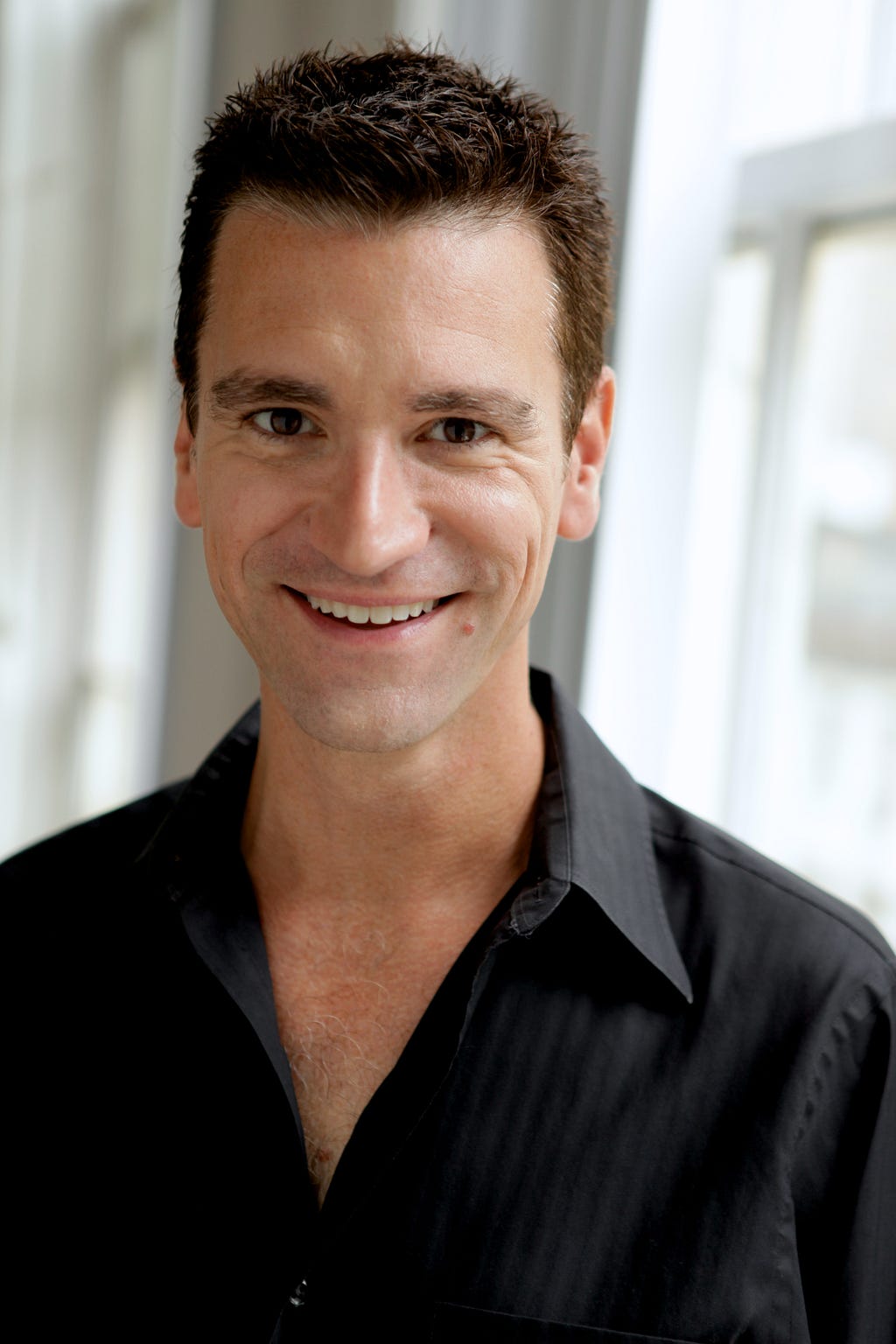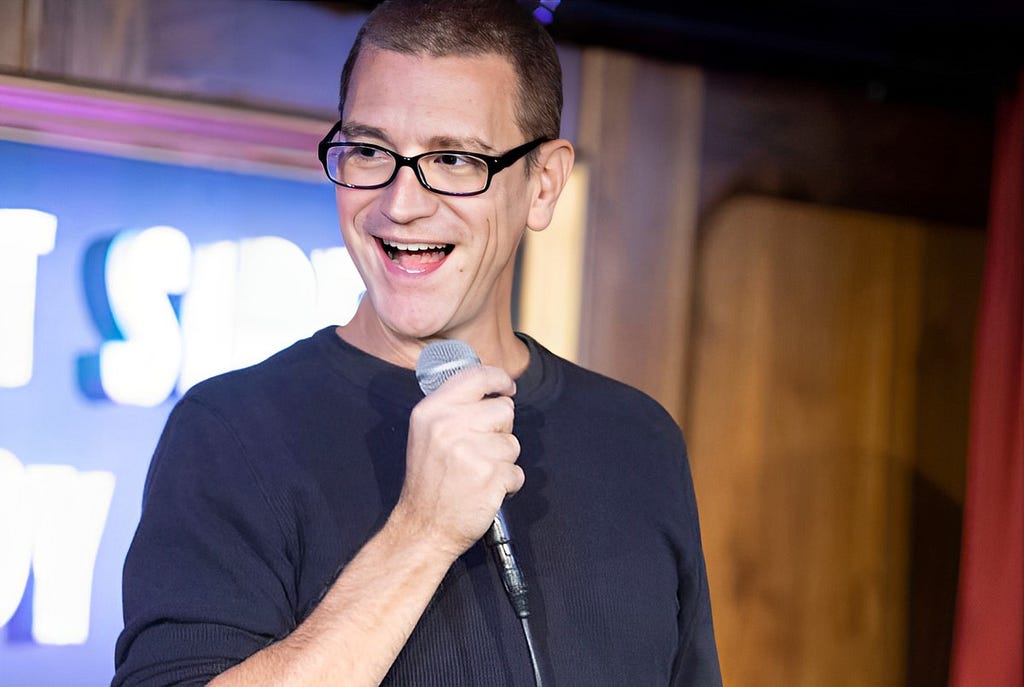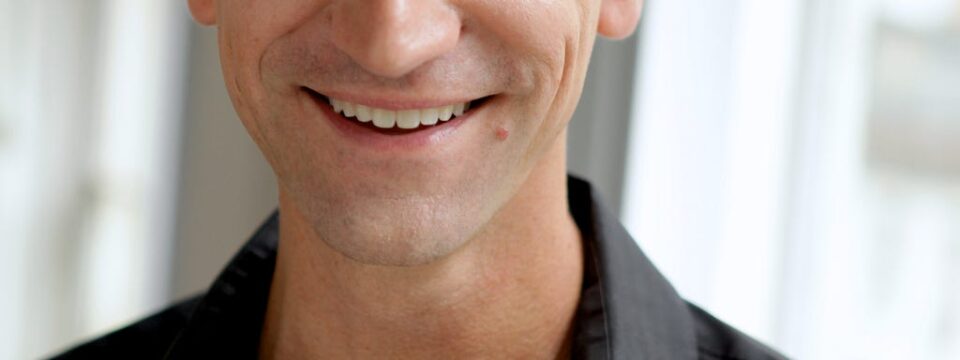
Never throw anything away. Your material might not work tonight, but in five years you might be better at communicating. If you think it’s funny, it is. Never give up on a comic idea; just put it away for a while while you grow into it.
As a part of our series called “Five Things I Wish Someone Told Me When I First Became A Professional Comedian”, I had the distinct pleasure of interviewing Clayton Fletcher.
Heard every day on Sirius/XM Radio’s Laugh USA, Blue Collar Comedy, and Jamie Foxx’s Foxxhole stations, Clayton Fletcher is an American stand-up comedian who lives in New York City and performs throughout the USA, Europe, Australia, Asia, and the Caribbean. Recently named ‘Best of the Fest’ at the Stockholm Comedy Festival, Clayton has been featured on Comedy Central’s “Comedy Central Awards,” MTV’s “New Year’s Eve Gala,” Hulu-TV’s “Comedy Brew,” AXS-TV’s “Gotham Comedy Live,” MSNBC’s “Your Business,” ESPN’s “World Series of Poker,” and Comcast-TV’s “Who’s Laughing Now?”
Clayton has taught thousands of aspiring comedians (and thousands of brave businesspeople) how to unlock the prodigious power of truth in comedy. He has served as Chief Comedy Officer at Peppercomm, a fully integrated strategic communications firm in NYC, for 15 years. His new book, The ROI of LOL: How Laughter Breaks Down Walls, Drives Compelling Storytelling, and Creates a Healthy Workplace, was co-authored with Peppercomm’s CEO, Steve Cody. It’s currently available for pre-order at www.roilol.com.
Clayton Fletcher allows us to see the world through the eyes of the son of a poker-playing mom and a jazz musician dad. His smart, clean, provocative comedy is geared toward audiences hungry for laughs without all of the crude shock value relied upon by so many modern stand-up comics. Drawing on his extensive theatre background, Fletcher brings to life all of the fun adventures his lifestyle provides every night in comedy clubs, theatres, colleges, banquet halls, cruise ships, cat cafes, and laundromats around the world. This comic proves once and for all that funny is funny, no matter who or even where you are!
Thank you so much for doing this with us! Our readers would love to get to know you a bit better. Can you tell us the story of how you grew up?
Growing up in Baltimore in the 1980s, I had a life that no one I knew fully understood, including me! My father was a musician and my mother was a poker player. I was the middle child and my younger brother was born on my first birthday. No wonder I’m on stage.
Trying to get my share of attention while observing that life need not be lived 9-to-5 led me to the conclusion that I would find my way, some way. I embraced the fact that I was different and learned to accentuate, rather than hide, those quirks that make me unique.
Can you share a story with us about what brought you to this specific career path as a comedian?
I originally moved to NYC to pursue a career on Broadway. At one point, I was working Off-Off Broadway in a production of Godspell in which I played the role of Jesus. My character got very few laughs and I came to realize that the laughs were what I wanted most of all. During intermission every night, the cast would crack each other up with roast-style fun and one night when I was really on a roll, my co-star (Judas Iscariot) suggested I try stand-up. My first response was, “I could never!”
That was 20 years ago. I owe that guy so much, at least 30 pieces of silver.
Can you tell us the most interesting story that happened to you since you began your career?
Very early in my career, I was on a lineup at a major New York comedy club with 35 other amateur comedians. At the beginning of the show, the place was packed and the crowd was excited. My slot was 36th out of 36, though, and by the time I took the stage, there was one guy left in the audience. After my third joke, he left.
If a joke falls in a comedy club and no one’s there to hear it…? Undeterred, I finished my set and when I came off the stage, I wanted to cry. On my way to the exit, I was stopped by none other than George Carlin, who had arrived early for his spot on the real show and evidently noticed me practicing for an empty room. He put his hand on my shoulder and said, “Keep kickin’ ’em in the a**, kid.” That’s a moment I’ll never forget.
It has been said that our mistakes can be our greatest teachers. Can you share a story about the funniest mistake you made when you were first starting? Can you tell us what lesson you learned from that?
When I started out, my hero was Lewis Black. I still think he’s among the all-time greatest stand-up comedians. I tried so hard to emulate his cadence, his mannerisms and his curmudgeonly delivery style. I was never able to make it work. Audiences evidently didn’t want to see a tall, thin, relatively young, arguably handsome guy ranting and raving about how ticked off he was. Let’s just say my tone has softened quite a bit over the years. I learned to be myself.
None of us are able to achieve success without some help along the way. Is there a particular person who you are grateful towards who helped get you to where you are? Can you share a story about that?
Drew Fraser is a veteran comedian and headliner who saw me perform very early in my career. Soon after, he offered me my first opportunity to work with a big star, David Alan Grier! I was very nervous about that show, but Drew encouraged me and gave me confidence that I was ready for the moment. The show went great and Drew took me on the road with him, where I learned from watching someone who could handle virtually any situation. Drew even helped me land my first national television appearance, which was AXS-TV’s Gotham Comedy Live.
Finding someone who’s ahead of you and who believes in you in this wild business, is extremely important. Even people who aren’t in show business say, “It’s who you know” and they’re right. Today, I relish opportunities to help newer comics climb a rung or two on the ladder as well.
You have been blessed with great success in a career path that can be challenging. Do you have any words of advice for others who may want to embark on this career path, but seem daunted by the prospect of failure?
I always tell people that the only reason to start performing comedy is because you absolutely love hearing people laugh. Sure, some go on to untold fortune and fame, celebrity cocktail parties in the Hamptons or South Beach, etc. But make no mistake: most of the insanely hilarious people I know are not famous. There’s not much room at the top, so you shouldn’t get into this line of work for that reason.
It’s got to be about the work itself, which is developing your own sense of humor and personal charisma to get belly laughs from total strangers.
You have such impressive work. What are some of the most interesting or exciting projects you are working on now? Where do you see yourself heading from here?
First of all, thank you! I’m currently most excited about a book that I co-authored along with Steve Cody called The ROI of LOL: How Laughter Breaks Down Walls, Drives Compelling Storytelling, and Creates a Healthy Workplace. In it, we explore what lessons businesspeople can learn from comedians in order to drive empathetic leadership and foster a healthy workplace culture. The book is set to be published in October 2023 and is available for pre-order right now at www.roilol.com.
I’ve also got a new special coming out in the spring called Middle Child Syndrome. In it, I explore that unusual upbringing I mentioned earlier and share my views on everything from wedding invitations to Sesame Street!
What do you do to get material to write your jokes? What is that creative process like?
I go onstage at least five nights a week and that’s where my jokes are actually written. The process involves first thinking of a comic idea during the daytime. This can be something I see on X, AKA “Twitter”, something my mother says during a phone call, something I get in the mail, or anything really. The key is I have a gut emotional response to it: fear, surprise, frustration, anger, any emotion.
At night, I try to convey that emotion onstage while developing the comic idea I thought of during the day. I record myself and then watch the video later to see what worked and what didn’t. Then the real fun begins, which is the revision process, which can last years. Material is worked and reworked and reworked some more and that’s what I love the most about creating comedy. It’s constantly evolving and improving, which is very satisfying for me as a performing artist.

Super. Here is our main question. What are your “Five Things I Wish Someone Told Me When I First Became A Professional Comedian” and why? Please share a story or example for each.
- Tell the truth. Modern comedy is not about “three guys walk into a bar” or anything off-the-wall. Modern comedy starts with authenticity and emotional fullness. I wasted years trying to be something I’m not.
- Say hello. The person you meet at an open mic or behind the bar might just be the boss someday. Be friendly and respectful to everyone, not just people you think can help you today. It’s good for your career and for your soul to treat everyone around you well.
- Save your money. If you get hot, you’ll start raking in the dough. This doesn’t last forever, not for any of us! Make sure you take care of your future self by investing in an IRA or similar program because nobody stays hot forever.
- Write jokes that can travel. You can’t just talk about the subway or the NYC mayor and expect the good people of Tacoma to relate. Talk about universal subjects so that you’ll get laughs on the road as well.
- Never throw anything away. Your material might not work tonight, but in five years you might be better at communicating. If you think it’s funny, it is. Never give up on a comic idea; just put it away for a while while you grow into it.
Can you please give us your favorite “Life Lesson Quote”? Can you share how that was relevant to you in your life?
My father always said, “short-term goals have long-term results.” Just like someone who is just learning to play the upright bass, a comedian develops at a slow and incremental pace. Take things one step at a time and treat it as a journey of growth. Trust and enjoy the process!
You are a person of huge influence. If you could inspire a movement that would bring the most amount of good to the most amount of people, what would that be?
I would bring nuance back to our communication. Whether it’s politics, business, religion, or even music, I believe people are too focused on trying to see things as black or white that are actually shades of gray. Cultish extremism is dramatically hurting our ability to connect with each other and to get along.
I see this in offices, families, and even among countries that might otherwise not be at war. We don’t have to agree on everything, but the concept of nuance seems to be marching toward obsolescence nowadays and it troubles me deeply.
Is there a person in the world whom you would love to have lunch with, and why? Maybe we can tag them and see what happens!
Lewis Black! My all-time comedy hero. I got to work with him once in Kansas City, Missouri. He remains a huge influence on me, even if I’m not still trying to copy his style.
Are you on social media? How can our readers follow you online?
I am @claytoncomic on TikTok, Instagram, and X (formerly Twitter) and can be found on LinkedIn. You can also follow the news of my upcoming title, The ROI of LOL, here.
This was so informative, thank you so much! We wish you continued success!
The pleasure was mine.
Clayton Fletcher: Five Things I Wish Someone Told Me When I First Became A Professional Comedian was originally published in Authority Magazine on Medium, where people are continuing the conversation by highlighting and responding to this story.
